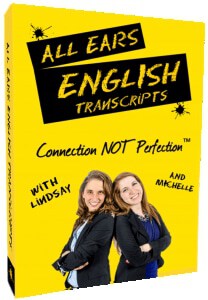
Have you heard somebody use the phrase “so much as” in English?
Have you ever heard the phrase “so much for” in conversation?
These phrases may seem very similar, and though they appear that way, just one word can make a huge difference when it comes to the English language.
We’re going to look at the differences between these two phrases, when to use them, and how these can fit into your conversations.
Sometimes one tiny word changes the entire meaning of an expression so that’s why you need to pay attention to the tiny differences.
Get Your Transcripts Today!

Make sure you understand every word you hear on All Ears English.
Bring your English to the advanced level with new vocabulary and natural expressions.
Subscribe and get the transcripts delivered by email.
Learn to speak naturally with the American accent.
Click here to subscribe and save 50%
We have a question from a listener today!
Hello ladies,
I was wondering if you could possibly discuss the phrase “so much for.” I always get confused with its meaning, such as when it just appeared on a TV show that I watch. I also get confused with “so much as.”
In the first example, they were using “so much for” about something that was left behind. The conversation went like this: “Help! It seemed like it was coming from around here, didn’t it? Everybody back to camp. Our packs! So much for my GPS and my satellite phone.”
In the second example, they were using “so much as” in a way that sounded serious. It went like this: “I will never abandon you. And even though I can’t always be around, if you so much as breathe my name…”
Thank you, I really appreciate your help!
Muller
Understanding Common Phrases
It’s interesting because these are both really useful English phrases, and you might not realize how similar they sound.
They have different meanings and uses in conversation, and that’s what you should focus on.
You wouldn’t necessarily place these two phrases in the same category because they are so different in their applications.
However since they are very close in their word choice, it’s something to consider.
The “so much” is of course the common portion here, but you get two very different meanings.
Just by switching “for” or “as,” you get a very different phrase to use in conversation.
This is something that you want to look at in English so that you are sure to use the right one, and to understand the meanings overall.
Analyzing Two Seemingly Similar Phrases
Understanding that these seemingly similar phrases are quite different is the first part of this.
Then you want to understand how they work and what their meaning actually is.
This is a perfect example of how just one word can make a huge difference in the way that you get a point across.
You have to see both phrases used in conversation to understand what the differences are.
Practicing using these is the best way to gain an understanding and to work towards making them a part of your everyday conversations.
Let’s look at these for a deeper understanding, and so that you can start to really appreciate the meanings and uses.
Using “So Much For” In Conversation
Let’s start by looking at the phrase “so much for” first.
You can see the meaning, the intent, and the way that you would use it in conversation.
So much for:
- There are a couple definitions online, but the best way to explain it is that it means “Well, I guess that’s over” or “Well I guess that’s not happening.”
- You are using the phrase “so much for” to indicate that something is over and done with, often in spite of your best efforts. You may have tried or put in effort, but it’s over or it didn’t happen.
- You may feel defeated or even frustrated and so you might say something like “I thought we were meeting on Tuesday but he said he can’t. So much for trying to make plans with him. He always cancels.”
- It’s used to say that though you tried, things just didn’t end up the way that you wanted them too. An example of what you might say would be “Oh my gosh I can’t believe it’s already 3am. I have to get up at 7! So much for sleep!”
Though you may feel defeated, it’s not always said in a serious or negative way.
It can be said in a sort of humorous or sarcastic way to keep it a bit more lighthearted.
It’s meaning is to say something like “I give up” but the tone that you use it will indicate if you mean it in a more serious way or a lighthearted way.
Using “So Much As” In Conversation
Though the differences between the two are seemingly insignificant, you will see that their meanings vary widely.
You will find that “so much as” is quite different in its application and usage.
So much as:
- The dictionary definition for this phrase is quite simply “even” and so you see that it’s quite different
- If you are talking about something and there’s an exception or a space for it in conversation, you would replace the chosen word with “so much as.”
- You can use it in a negative way or to really get your point across, and in that instance you would say something like “Be quiet. If I hear so much as a peep from you, you will not get any dessert!”
- You may also use this to show a sort of extreme and then you would say something like “I hate olives. If I so much as accidentally get a taste of an olive on pizza, I get upset!”
As you can see, these two are very different but only because of one word.
This one word can make a big difference, and that’s why it’s best to think in chunks and idioms.
Roleplays Help To Highlight These Phrases
Since the difference here is slight, you want to be sure that you see how this works firsthand.
This is where a roleplay can really come in handy, and so we’re going to take a look at one that highlights these phrases.
In this roleplay, Lindsay is Michelle’s teacher and is giving instructions on the first day of class. (She happens to be very strict in this roleplay)
Lindsay says: “There will be NO talking when I am writing on the board. If I hear so much as one word you will be sent to the principal’s office.”
Michelle says: “Okay I understand. Can we talk during the break?”
Lindsay: “No.”
Michelle: “So much for a fun class!”
There are different ways to use these phrases, but this is the focus for now.
Pay attention to how and when you hear these phrases used.
You may hear them used in different formats or ways, or even have a change in word placement.
Takeaway
These are two very useful and natural sounding English phrases that you will hear a lot in conversation.
Notice how one word can change everything– even just one small word!
Try using these phrases, because though they are short they can really make you sound more natural in English.
These two words would also be impressive to use on the IELTS Speaking test if you are planning to take the exam soon.
Sometimes the greatest expressions aren’t complicated sounding or fancy, but small, like these two phrases.
Know the differences and the right way to use them, and this will come with time and practice.
This can be very useful in conversation, and therefore are worth trying–this is how you make connections!
If you have any questions, please leave them below in the comments section.
We’ll get back to you as soon as we can.








